Meet Carole Bamford: the ‘Queen of the Cotswolds’ who’s behind a luxury organic food farm
The OG ‘think-global, act-local’ influencer has built an eco empire with Daylesford Organic.
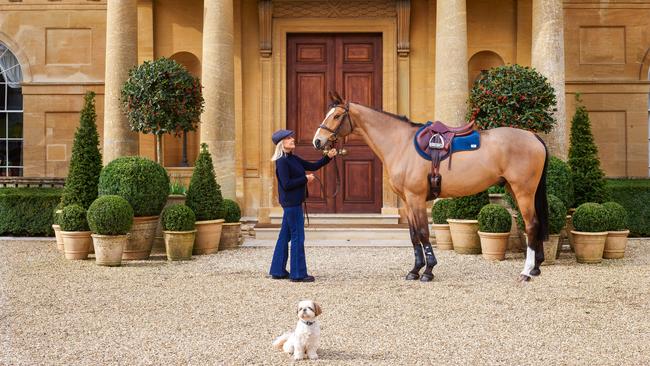
It’s a grey and rainy 11am in Daylesford, Gloucestershire, but Carole Bamford has already been up and at it and sun-salutating for ages. From 6.45am, for an hour and a quarter, the spry, tanned and sparky septuagenarian will concentrate on yoga and breathwork. Some stretching and meditation. “Then I do my mantra, some pilates and weights. On rest days, I walk the dogs.” There are similar morning regimens at the Bamfords’ homes in Barbados, London and at Château Léoube, the family’s 226-hectare vineyard estate near Toulon in the South of France.
For breakfast, it’s avocado and tomato salsa to eat, with Symprove probiotic supplement, apple cider vinegar in hot water and ginger- lemon tea – “for my gut”. “If your gut’s healthy, you are a happy person,” she says. “The gut is the body’s brain.”
Carole Bamford reads first the Racing Post (the keen rider and racehorse breeder established the Daylesford Stud back in 2000) followed by the Daily Mail and The Times (London), always laughing at columns by her friend and fellow Cotswolds farmer (and petrol head) Jeremy Clarkson. “Did you know he’s started doing pilates?” she hoots. “I can’t imagine Jeremy on a reformer machine. Can you?”
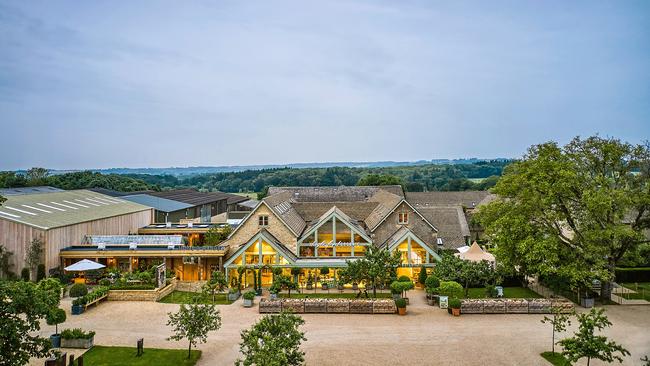
The Daylesford team, she reveals, tried to feed beer and chocolate-guzzling Clarkson during lockdown, sending care packages of organic produce – cartons of bone broth and posh ready-meals – 10 kilometres across the Oxfordshire countryside to the former Top Gear presenter’s home. “But it was difficult because he hates anything healthy!” (Boris Johnson, the UK prime minister during the pandemic and also a close friend of the Bamfords, was another loyal Daylesford Organic food recipient, ordering some $25,000 worth for his Downing Street home during the pandemic.)
We’re meeting at the boardroom at The Hive, on the tastefully drab-painted, immaculate sprawl of the Daylesford Organic campus, a retail pleasuredome, wellness hub and working farm shop known to Cotswolds locals and super-affluent weekend homeowners as “the mothership”.
To get to the office, where some of her 700 staff are working, you walk through an interiors store, a Bamford clothing boutique, a food court with bakery and patisserie, a creamery and butcher and smokehouse, several restaurants and cafes (awarded Michelin Green stars) and a Léoube organic wine shop. Then past a cattle shed full of happy, unstressed and photogenic calves, and the wood pellet-burning biomass facility that powers the whole site with compacted sawdust collected by the farm’s tree surgeons.
Don’t miss your copy of the April issue of WISH magazine in The Australian available on Friday, April 4
Adjacent to The Club by Bamford – Daylesford’s private members club featuring a gym, cycle room, swimming pool and ice baths – is a calm and sweet-smelling, Swiss-clean environment selling the ambrosial and often geranium-based Bamford products that will soon be available in the new Mecca beauty superstore on Bourke Street, Melbourne (as well as through Mecca online). Geranium has been Carole Bamford’s favourite fragrance ever since she inhaled her mother’s Floris scent as a young girl. Her private greenhouse up at the family’s magnificent Daylesford House houses 120 varieties of pelargoniums and geraniums.
At the Daylesford Organic mothership’s exterior there is a garden centre, some cute cottage rentals and, perhaps most impressive, the carpark which looks like a hyper-luxe flash mob – rank after rank of sleek electric-powered SUVs, Range Rover and Porsche wheel arches splashed with yellowy, limestone mud, bonnets still warm from the Friday night commute out of London.
“The Cotswolds”, thanks in part to Carole Bamford for kind-of inventing its modern iteration, has now become such an internationally recognised, aspirational touchstone and “brand” itself that there even exists a Range Rover Burford edition, named after the pretty Oxfordshire market town a few miles away. The $558,000 model launched last year at – where else – Daylesford’s Heritage House building. At weekends, the same exotic array of vehicles is parked outside the Bamford-owned Cotswolds pubs The Wild Rabbit, The Fox and Charlbury’s The Bell.
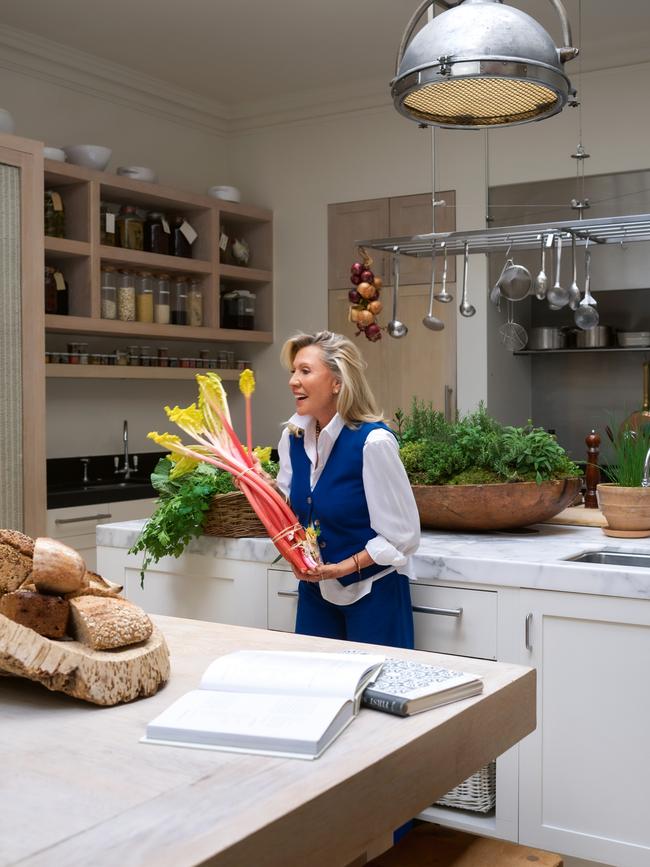
Certainly, in terms of scale and ambition, this is no rich girl’s plaything project. And Carole Bamford is no eco-arriviste. Like Martha Stewart (a frequent comparison), she is determined, patient, connected and pioneering, her long career peppered with organic and sustainable firsts that remain a source of genuine pride.
When it came to selling her non-homogenised milk in the store, for instance, Bamford tapped her friends in the Rausing family – the founders of Tetra Pak – to develop a chalk-based sachet that was half the weight of conventional milk packaging, required less energy and water to make and produced far fewer emissions. “The material is called Ecolean, it comes on a roll and we had the first machine for it in the world right here,” she explains.
“Coffee beans from the cafe are repurposed as abrasives for our Bamford skin scrub,” says Lady B (please don’t call her “Lady Bamford”, or “Baroness Bamford”, even though those are her official titles – she’s OK with “Lady B”, btw). She urges me to see the abattoir before I leave – meat and organic chickens being star products. Yes, a Daylesford bird is expensive – almost $50, about three times the price of a supermarket chook, she admits, but the free-range provenance and beak-to-tail usage is unmatched. Leftover bones are used to make broth and then crushed for plant fertiliser. The chicken’s feet are saved and shipped off to China where they are consumed as a delicacy. “I think we’re not used to paying the right price for food,” she says when pushed on pricing. (Daylesford’s small but utterly delicious Good Life loaf – organic psyllium husks, oats, sunflower seeds, linseed, flaked almonds, chia seeds and maple syrup sells for more than $20 … and is always, always sold out).
“Do you pay a proper price for your food now, or do you pay a much more serious price in the doctor’s surgery later on?”
A pause, while she checks herself for being too much of a shouty-militant eco warrior. (She’s much too shy and nice for that.) “I have so much to say about all this and I could go on.” And she must.
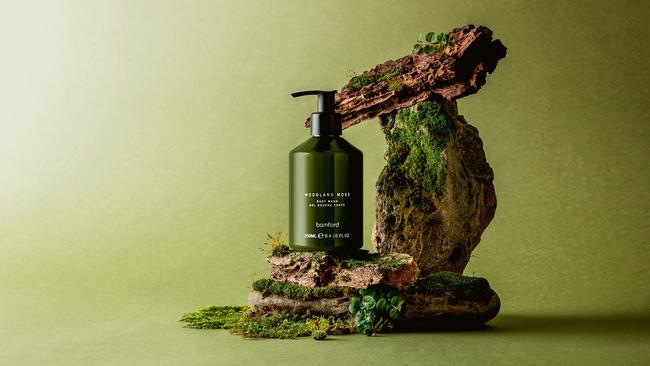
“In the days when bread was taken home in a basket or string bag, meat and fish was wrapped in paper, fruit and veg sold in paper bags. No plastic at all! We should go back to those times. Forget the supermarket and shop locally instead. If we were to examine our blood now, we’d find it was full of microscopic plastic particles. This stuff is killing us!”
Despite the virtuous packaging policy, the woodchip power source and the humane slaughter facilities, the gut-friendly diet and breathwork, the quietly persuasive Bamford prefers to be honestly good living rather than drearily “perfect”.
She enjoys the sparkling variant of wine from her own vineyard. “I also travel by helicopter. I’m not perfect.” Jet-set privilege used to make her feel bad (the Bamford family and its JCB construction equipment is estimated to be worth nearly $20 billion), now she offsets her carbon footprint and occasional guilty pleasures with industrial-strength vigour and boundless pro-activity. “I am a bit mad, though. Have you noticed?”
The journey of Bamford, born Carole Gray Whitt and brought up in Nottinghamshire in the 1950s, to both village and brand began in the 1970s when the young mother was living in Staffordshire and nursing her first born Alice, now 48. (She also has two sons – Jo, 46, and George, 43). “I needed something to do so I got interested in gardening.”
While her husband, Lord Anthony Bamford, chairman of the JCB since 1975, was at the local factory overseeing the manufacture of earthmovers, she became concerned with the earth itself. Particularly her daughter’s pram’s proximity to the chemicals and airborne pesticides being sprayed on the Bamford farm’s crops. Intrigued, she visited a local agricultural show and discovered a little tent bannered “organic”. After two hours in the company of some maverick farmers, she came home and made an announcement, “We have to change the way we farm – we’re killing the soil. We’re killing everything”.
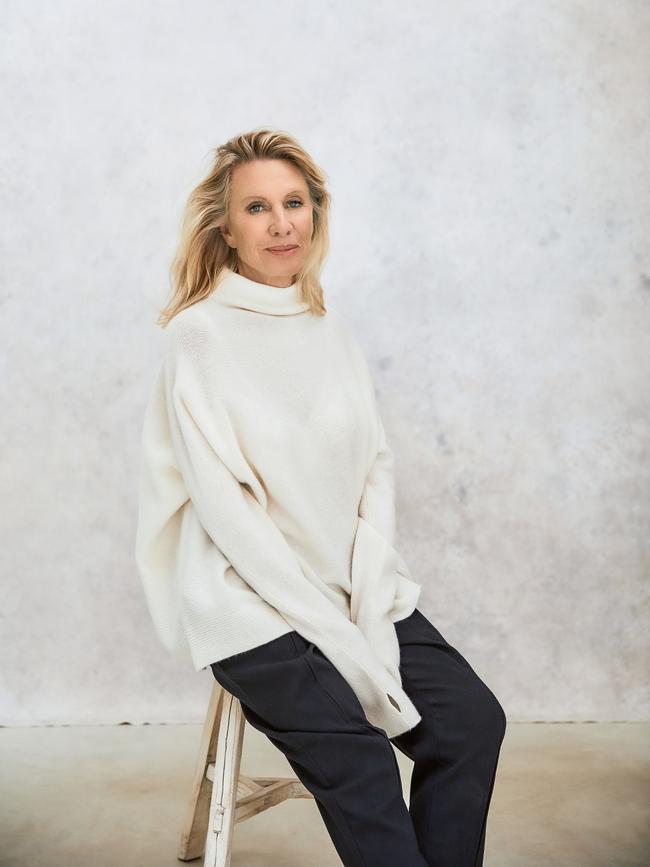
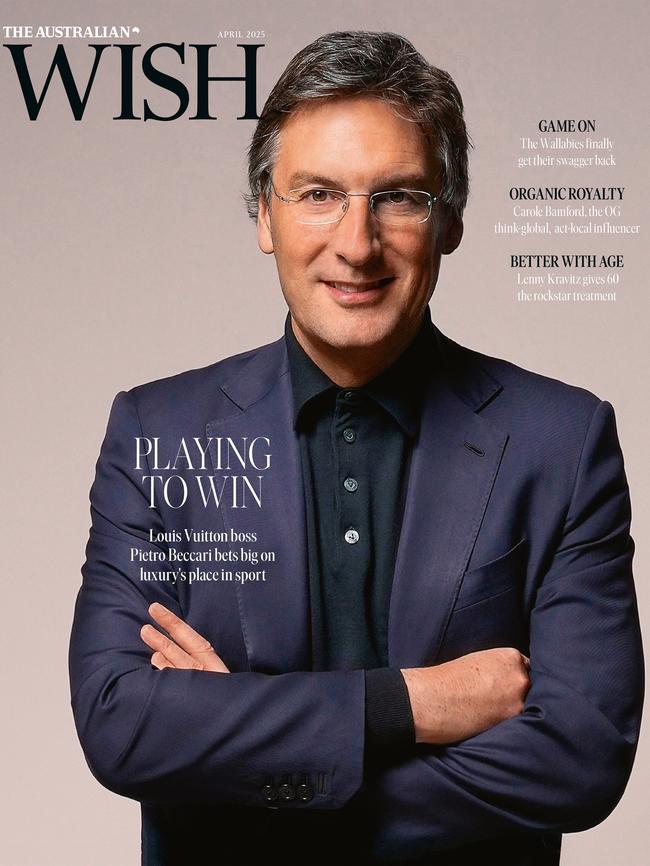
The farm managers weren’t convinced. “They thought I was absolutely mad – this silly girl.” Seven years later, the same farmers were on board and the 1200-hectare farm was operating as 100 per cent organic. “The animals were treated homeopathically instead of with antibiotics and were healthier. Yes, a huge investment in stuff like putting back all the destroyed hedges, and it certainly didn’t help that yield went down at first. People thought we were crazy, but it worked. We started selling organic meat to UK supermarket chain Marks & Spencer.”
Bamford also converted the dairy herd to organic and commandeered a vacant barn as a creamery and operations centre and, with the help of American cheesemaker Joe Schneider, produced an organic, award-winning cheddar. “I had no idea how to make cheese, but 18 months later, we took the cheddar to the World Cheese Awards in Bra, Italy and won the gold prize.”
So, way ahead of her other famous farming neighbour, Blur bassist-turned cheesemonger Alex James, who works the Kingham land just a few miles from Daylesford? “Oh,” says Lady B in mock indignation. “Way ahead.”
Ever since she was a little girl, Carole Bamford always wanted to have a shop. Her first was called Country House Essentials, back in her Staffordshire days. “We sold cashmere and tartan and all the other things that American tourists might like.” Food, beauty and cheese products and clothing came later when the Bamfords purchased the Daylesford estate in 1988.
“There was no ‘vision’, or big plan,” she says. “It was more of an open-window moment.” She worked on instinct and the advice of friends. “Prince [now King] Charles – he was so on it, the organic/sustainable thing – and Teddy Goldsmith editor of The Ecologist. Then I met Patrick Holden [a UK organic dairy farmer, founder and chief executive of the Sustainable Food Trust]. And Carlo Petrini, founder of Italy’s Slow Food movement, who is wonderful.” (Carole Bamford, btw, seems to know everyone.)
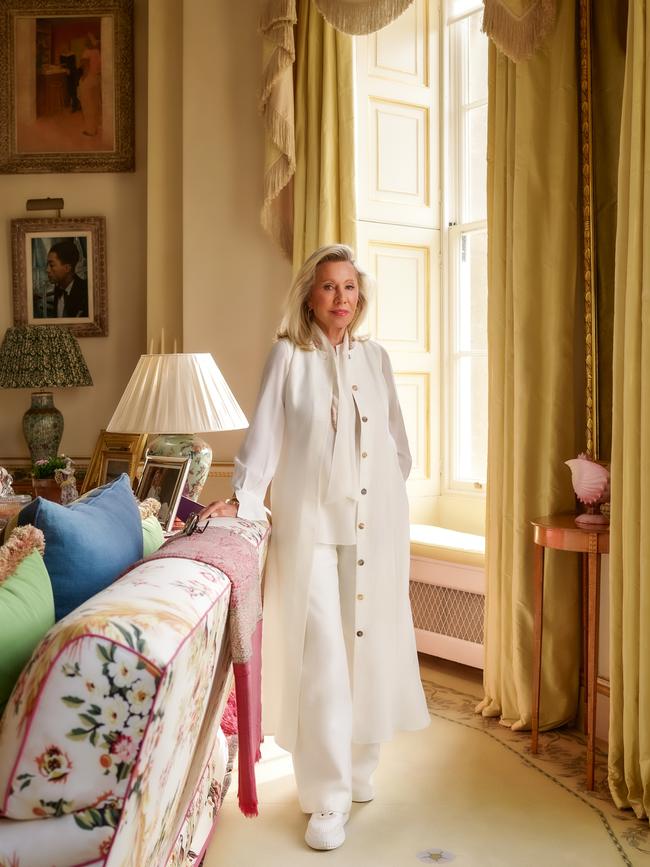
“Of course, I am lucky to have a very supportive husband. But he’s also very tough on me, you know. He’s 80 this year and still goes to work every day. We both do. Retirement isn’t an option.”
Does she have any competition? From Meghan, Duchess of Sussex perhaps? Or even her own daughter Alice, who runs a biodynamic farm, beach restaurant and store in California.
Following Carole Bamford’s burgeoning, global success, a slew of copycat outfits seem intent on trying to emulate her business model.
“This friend of Martha Stewart’s called me for advice during lockdown. He has his own brand called Flamingo Estate, backed by Kim Kardashian, have you heard of it? Well, he’s making a fortune in the US.” She’s talking about Australian-born, Los Angeles-based Richard Christiansen who owns Flamingo Estate. “He is so in love with all things Bamford, he even called his dog Daylesford.”
How about the Duchess of Sussex whose American Riviera Orchard preserves start-up was recently relaunched as the Netflix-funded As Ever brand, promising to luxuriate the jam industry. “Before you launch anything, you have to do the hard work and get everything in place – with us it was the farm animals and soil. For the first 20 years, we didn’t make or sell any of our own products.”
There is no such artifice in the Carole’s Bamford/Daylesford world. She identifies as “farmer” rather than “entrepreneur” or “guru”, her mantras being “truth, trust and transparency”. “Good feeling, good products.” She is the original, think-local/act-global shopkeeper, with her Bamford products currently on sale at more than 70 stockists around the world, and the ever-expanding Cotswolds store, a totem of a good life, lived well. Now a youthful 78 years old, gut and brain in rude health, she’s way ahead and unstoppable. “No one’s going to catch up with me,” she says. “No one.”
This story is from the March issue of WISH.



To join the conversation, please log in. Don't have an account? Register
Join the conversation, you are commenting as Logout